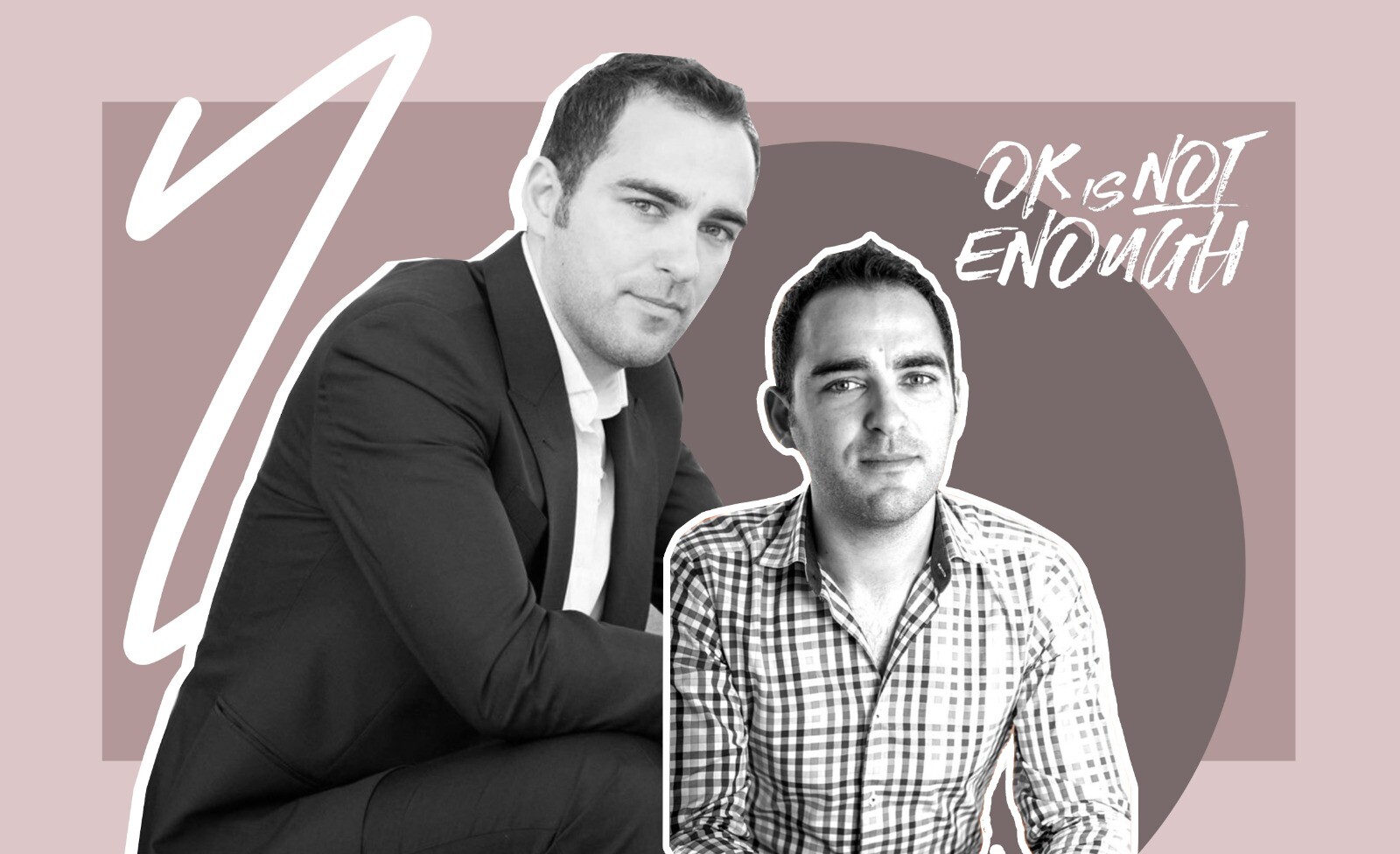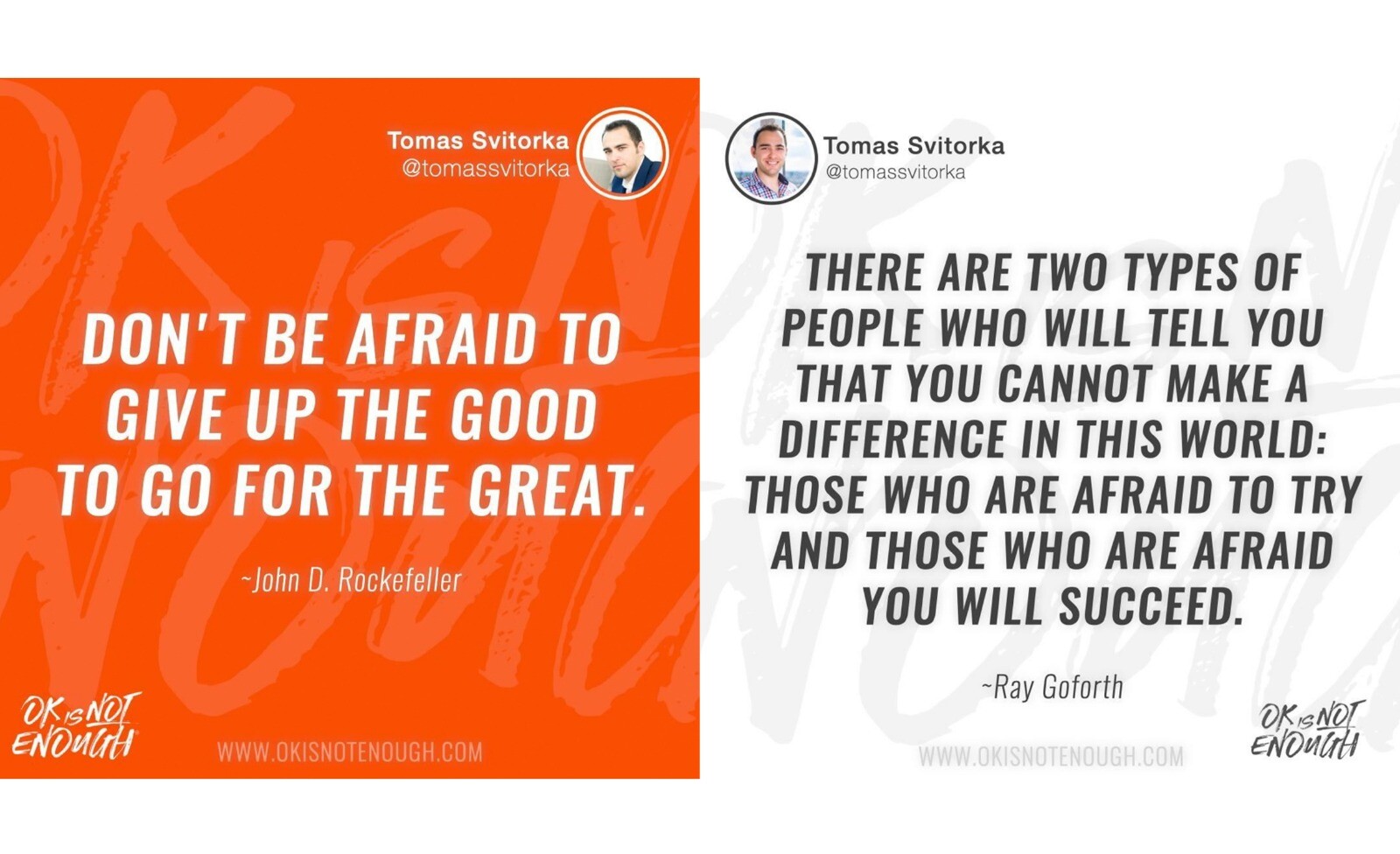
Among the maelstrom of negative news, the future seems most daunting for Generation Z (16-24-year-olds), who are having to enter the job market, which has been severely constricted by the Corona Virus. Furlough, redundancy, the soul-sapping work of job hunting – it can be difficult to stay positive in such challenging times. That’s why we spoke to Tomas Svitorka, a professional life coach and award-winning entrepreneur, who offered practical advice on how to reach your career goals despite the difficult circumstances.
When he founded his life-coaching business, Tomas named it after his central philosophy: ‘OK Is NOT Enough’. With this in mind, he coaches professionals on how to raise their standards so that they achieve the lifestyle they desire. His large client base includes industry leaders, wealthy entrepreneurs, and successful influencers who testify to his insightful and empowering coaching style. Tomas has been featured in publications such as GQ and Vice, and has appeared on podcasts such as ‘The Unconventionalists’. He is currently finishing his first book, which aims at helping those who have settled for an ‘OK’ life to escape to something better. It is due for publication later this year.
What tips do you have for increasing self-discipline and reducing procrastination when job hunting, especially while being at home?Tomas is sympathetic about the tedium of job hunting, acknowledging that it is a “stressful” and “overwhelming” task. He recommends “setting daily targets of specific tasks, such as: how many jobs to apply for each day, how many people to reach out to via LinkedIn.” And even if you won’t be seen when seeking employment, it’s important to look the part – dressing professionally will help you get into a “work-like mindset when applying for jobs”. He advises taking your laptop to a café or co-working space, as being in a new environment (and not just in your pyjamas, in bed) may give you more confidence about the jobs you are applying for.
What advice would you give about presenting the most desirable and driven version of yourself to potential employers? Research is key. Before an interview, you should “find out about the history of the company, values, mission, vision, and especially their culture”. LinkedIn can be useful for this – if you have a connection with an employee at the company, “reach out to them” to ask “what the company looks for and values in their employees.” It’s also important to think about your personal brand. Tomas is upfront about the positives – and potential pitfalls – of the internet as a research tool. “Nowadays, with the all-permeating internet and the transparency it brings, all of us are just a quick search away. And employers and recruiters do their research. What would they find if they googled your name?”
This can be an opportunity to stand out from the crowd; having a personal website, published articles, a podcast, a YouTube channel, or even a polished LinkedIn profile can make all the difference when it comes to the job market. It can even do the work for you; Tomas points out that “very often, when one has a high-quality personal brand, they are hunted by employers and offered opportunities, rather than hunting for jobs.”
How do you build confidence and reduce anxiety when speaking to potential employers, especially during a phone interview?The answer is simple: preparation. “Confidence comes from competence,” says Tomas, and “competence comes from preparation and experience. Prepare, prepare, prepare.” You should know your work history and relevant skills inside out – a good way to ensure this is by rehearsing common interview questions with a friend.
Tomas has an exercise he often uses to help his clients boost their self-confidence: to write a list of 50 accomplishments and why you’re proud of them. “This exercise will remind you of your qualities and achievements which we often forget or dismiss. That is a great confidence boost.”
Before the interview, Tomas recommends taking 20 deep breaths to counter anxiety and calm yourself down. It’s important to focus on the positives: “If they want to interview you, they must believe you’re a good match.”
And finally, remember that the job has to be a good fit for you too. Tomas compares an interviewee’s state of mind to be a contestant on the X-Factor: you don’t have to “sing, dance, or juggle”, afraid of Simon Cowell. “It’s an important decision, and it needs to feel right for you as much as for them.”
What would you advise people with Sunday night fever? Do you have any tips for starting the working week as well as possible?
Tomas has no time for the Sunday scaries. If you’re dreading going back to work, “then you’re most likely in the wrong job, role, or industry.” When we spend so much time at work, “we should do something that we love or at least enjoy.”
It can be hard to leave a job when it pays the bills and provides stability – but your work shouldn’t be a “tolerable misery”. If you dislike your job, it’s best to set aside some time each week searching for something better. “Speak to recruiters, apply for a few jobs, go to a few interviews” – interviews, in particular, are even easier now that they’re mostly online.
You’re most likely going to be working for decades to come, but that should spur you on, not put you off: “spending a few months finding something you’d love and enjoy, possibly for decades, is well worth the effort.”
Many people see being made redundant as a form of failure. How can people overcome this? The crucial thing is how you frame your experience. If your company was hit by difficulties resulting from the pandemic, redundancies probably have “very little to do with your performance”. Tomas knows this from industry insiders: “I’ve spoken to business owners who were absolutely devastated because of the redundancies they had to make.”
But you can still choose to look on the positive side. “If you loved the job, at least now you know what you love and what to look for next.” If you didn’t love your job, “now you can look for something better.”
“OK Is NOT Enough”, i.e. never settling for average, is the philosophy you stand by. How do you encourage people not to settle for less when jobs are sparse?“We are drawn to comfort and safety. That’s where life feels OK. OK is comfortable, but rarely happy and fulfilling. I encourage people to not settle for OK but rather try to get the best out of themselves and their situation. It’s not easy, but the growth and results are incomparably more fulfilling.”
Of course, it’s relative to the circumstances. “The job opportunities are different for many people than, say, a year ago. So now, more than ever, ‘OK is NOT enough’ applies.”
Tomas says that this is relevant across all aspects of your career: “Don’t submit just an OK application. Don’t prepare to just an OK level for your interview. Don’t have just an OK online presence. Don’t show that you’re just an OK employee doing an OK job.”
And finally, don’t give up hope: “The reality is, the jobs are out there, and someone’s going to get them.”

Do you have any practical tips for those who find themselves suddenly unemployed? How can people keep positive and stay resilient?Once you start sliding into negativity, it’s much harder to stay motivated. Tomas advises keeping a routine – get up early and “get ready for the day as if you were going to work.”
Try to keep things in perspective: “Realise that this is not the end of the world”, and it was just one job among the many you will have in your lifetime. It’s good to stay busy and “give your mind something positive and productive to think about”, so your thoughts don’t become overrun by negativity. There are even motivational videos on YouTube if you need an external boost to start your day; Tomas recommends Les Brown, Absolute Motivation, and Motiversity. If you need some real inspiration, search for Nick Vujicic.
For those who have recently lost their job, how can they use their time to better themselves and their mindset before applying to new jobs?
If you have the time and the means, it’s sometimes best not to seek out a new job straight away. It can be beneficial to “take some time and ponder where you’d like your career direction to go from here.” Assess whether you need new skills or qualifications to achieve your goals, or see this new stage as an opportunity: “Could this be the time when you take the leap and follow your passion or even start your own business?”
Risks can be scary, but they’re often rewarding. Tomas describes the importance of being daring: “Making decisions from the place of fear and scarcity will make you go for safe, survival options, rather than something more meaningful and fulfilling.”
What is your core advice when overcoming setbacks? How do you turn these setbacks to successes in the long run? Tomas is candid about the ups and downs we all face: “Setbacks are inevitable and failures are part of life.” But these shouldn’t define you; in fact, he argues that “the most successful people have failed more than anyone.” The key is that they “use these failures as an opportunity to improve and grow. They don’t dwell on it. They learn from it and bounce back better and stronger.”
Failure is often tainted with embarrassment – we are afraid of what other people think of us. But more often than not, this is wasted energy: “The reality is, people, think about us way less than we’d think. Most people are busy worrying about what others think about them.”
And after all, the best part of success is knowing that you’ve worked for it. Tomas points out that when people come across an “easy and effortless” path to their goals (such as winning the lottery or being promoted through nepotism), they often suffer from imposter syndrome because they are aware that they haven’t earned their place.
It can be helpful to look at things from another perspective: “Think of anyone who inspires you and ask yourself why they inspire you. I doubt it’s because they had an easy life.” We feel a greater sense of achievement when we’ve had to work hard for our accomplishments.
Job hunting can be overwhelming and time-consuming. What advice can you share to help workaholics detach and take a break?Tomas is all for hard work and concentration: “If someone is working their butt off to find the next awesome job and to maximise their chances of getting it, I would not discourage them from it in any way. Good on you, go get them!”
But obviously “it’s important to keep a healthy balance” so that getting the job doesn’t take over other core areas of life such as health and family. Tomas himself is careful to keep a balance, despite his busy schedule: “Every day I make time to meditate, read, stretch, eat well, and on top of that, I run about 70km a week.”
He recommends taking breaks, meditating, eating well, and exercising to allow yourself to perform at your best and to decompress. Planning your schedule in advance also lends stability and balance – if you get caught up in the moment, “things will go out of balance at the expense of other areas of your life.” Much of Tomas’ advice would be useful in any circumstances: take time to figure out what you want, work hard, and stay focused. But during these particularly troubled times, it seems more important than ever not to get swept up in the swirl of bad news and negativity. Amidst the uncertainty and job losses caused by the pandemic, his can-do approach is a welcome tonic. His advice on setbacks is perhaps the most powerful for the present moment; success and struggle go hand-in-hand, and you’ve got to ride the lows to enjoy the highs.
Words by Jaleh Brazell Graphics by Georgia Walters







